Helen M Jerome reviews
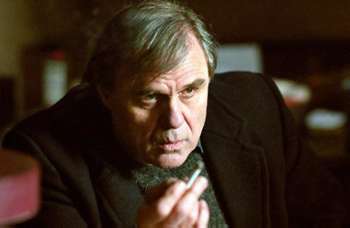 Renaissance is the word that keeps coming up when modern German feature films are mentioned.
Renaissance is the word that keeps coming up when modern German feature films are mentioned.
After all, any card-carrying film buff will definitely have seen the perfect quartet of Downfall, Goodbye Lenin, The Lives Of Others, and The Baader-Meinhof Complex in the last few years. These are features that manage to absorb and entertain, yet pull no punches, while exploring the recent past in Germany East and West. And after seeing a dozen movies in 2008’s wonderful German Film Festival, it’s hard to argue that there’s anything other than a genuine resurgence in the ambition and confidence of European film in general, and German film in particular. Experimentation in form and content, variety in genres, some outstanding acting performances, and the appearance of many of the filmmakers in lively Q&A sessions made for a richly rewarding cinematic week. The really good news is that most of these films will be distributed in the UK over the next few months – so you can see them and judge them for yourselves.
If the aforementioned quartet all hold an unflinching mirror to uneasy periods in Germany’s past, then many of this festival’s films deal bravely with some of society’s taboos. Kicking off proceedings was A YEAR AGO IN WINTER (right), another outstanding feature from Academy-Award-winner Caroline Link, which tackles the devastating and lingering effect of a teenage suicide on the rest of the family. The still-grieving mother commissions a troubled artist, Max, to paint a portrait of her living daughter Lilli and beloved dead son Alex together, which opens up old wounds. The emotional intensity between Lilli and Max, the ongoing sibling rivalry and love between Lilli and Alex, and Lilli’s recklessness and desperate loneliness are all given rare depth by deliberately long takes and thoughtful editing. Remarkable performances from newcomer Karoline Herfurth as Lilli, and Josef Bierbichler as Max also help make this a rewarding, highly-moving study of bereavement.
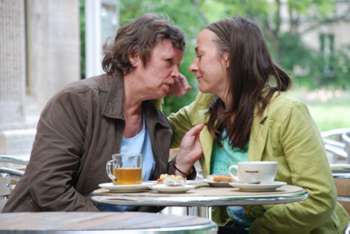 The taboo in director Andreas Dresen’s closing film, CLOUD 9 (right), is old love and sex. The elderly are normally invisible in film and in society itself. But this is a celebration, as well as an intimate portrait, of unexpected, late-flowering romance between a married sixtysomething seamstress, Inge, and a 76-year-old man, Werner. There is warmth and tenderness in this often-funny drama, but there’s also the inevitable pain inflicted on Inge’s husband Karl, who likes nothing better than listening to recordings of steam trains, and suddenly finds himself discarded in the love triangle. Minimal dialogue and naturalistic, improvised acting from all three make a refreshing change from endless, empty dramatisations of teen romances.
The taboo in director Andreas Dresen’s closing film, CLOUD 9 (right), is old love and sex. The elderly are normally invisible in film and in society itself. But this is a celebration, as well as an intimate portrait, of unexpected, late-flowering romance between a married sixtysomething seamstress, Inge, and a 76-year-old man, Werner. There is warmth and tenderness in this often-funny drama, but there’s also the inevitable pain inflicted on Inge’s husband Karl, who likes nothing better than listening to recordings of steam trains, and suddenly finds himself discarded in the love triangle. Minimal dialogue and naturalistic, improvised acting from all three make a refreshing change from endless, empty dramatisations of teen romances.
One ongoing taboo brought sharply into focus by the so-called War on Terror is the post-traumatic stress disorder, or PTSD, experienced by returning soldiers. Brigitte Maria Bertele’s ironically-titled drama, HERO’S WELCOME, follows David as he comes back to his Black Forest home. Not only is David unable to process the traumas he experienced in Afghanistan, as he constantly relives them, but he cannot relate to his eager girlfriend, emotionally or sexually, and turns against his family and his best friend. The only person David engages with is his eight-year-old half brother, Benni, who idolises and imitates him, with potentially disastrous consequences. As Bertele says: “These young men are bringing the war home in their heads and their hearts – and this is a new experience for Germany.”
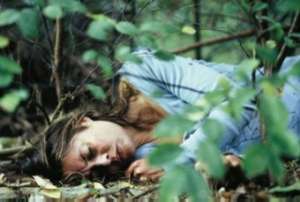 THE STRANGER IN ME (right) is Emily Atef’s uncomfortable, but compelling exploration of the taboo of post-natal depression in one mother. Despite giving birth to a healthy baby boy and her loving husband being buoyed up by fatherhood, Rebecca is cast adrift by her inability to relate to her child and her sense of alienation. With increasing speed, Rebecca crumbles as she seems to be heading towards a point of no return. But there is hope and redemption in this drama, and it’s the powerful, bruising central performance of theatre actor Susanne Wolff that pulls the viewer through.
THE STRANGER IN ME (right) is Emily Atef’s uncomfortable, but compelling exploration of the taboo of post-natal depression in one mother. Despite giving birth to a healthy baby boy and her loving husband being buoyed up by fatherhood, Rebecca is cast adrift by her inability to relate to her child and her sense of alienation. With increasing speed, Rebecca crumbles as she seems to be heading towards a point of no return. But there is hope and redemption in this drama, and it’s the powerful, bruising central performance of theatre actor Susanne Wolff that pulls the viewer through.
Sprinkled generously amidst the festival’s taboo themes were some equally bold features. NORTH FACE is a spectacular cross between Touching The Void and Titanic and should be a big hit when it opens in the UK this December. Focusing on the true story of an ill-fated climbing expedition in 1936, it stars Benno Fuermann and Florian Lukas as gung-ho climbers Toni and Andi, and Johanna Wokalek as photo- journalist Luise, who is torn between her professionalism in covering the climb and her love for Toni. Unfashionable values like comradeship, courage and rivalry propel the adventurers and the plot forward – to a truly dramatic climax.
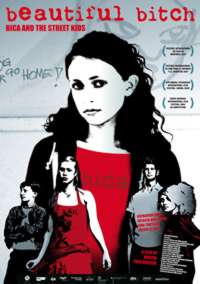 With a smaller budget, but equally dramatic narrative, comes CHIKO, a sort of Turkish-German Scarface. Set in Hamburg, it features Denis Moschitto as the eponymous anti-hero rising up the drugs trade hierarchy, and one of Germany’s biggest stars, Moritz Bleibtreu as the violent, charismatic drug lord perched at the top of the heap. Revenge, conflicted loyalty, lust and greed threaten to thwart the progress of Chiko as he moves up from dealing grass to coke, and from a scuzzy flat to a glamorous penthouse suite. But is there any way he can stay there?
With a smaller budget, but equally dramatic narrative, comes CHIKO, a sort of Turkish-German Scarface. Set in Hamburg, it features Denis Moschitto as the eponymous anti-hero rising up the drugs trade hierarchy, and one of Germany’s biggest stars, Moritz Bleibtreu as the violent, charismatic drug lord perched at the top of the heap. Revenge, conflicted loyalty, lust and greed threaten to thwart the progress of Chiko as he moves up from dealing grass to coke, and from a scuzzy flat to a glamorous penthouse suite. But is there any way he can stay there?
Another staggering, streetwise performance belongs to Katharina Derr as the Romanian title character in BEAUTIFUL BITCH – even more remarkable as this is Derr’s debut. Action centres around a small gang of teenage pickpockets operating in Germany and answerable only to their Fagin-like godfather, Cristu. They live off their wits and are controlled through genuine fear of Cristu’s temper, but when ‘Bitch’ falls in with a rich girl and her friends, she glimpses another possible lifestyle outside crime. Can she escape?
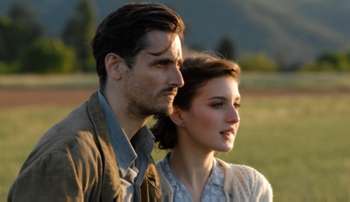 Two very different, but interesting Hispanic-German collaborations are THE ANARCHIST’S WIFE (right) and MY MOTHER’S TEARS. Both are based on true stories: the former going back to the Spanish Civil War and the French Resistance in World War 2; the latter tracing the debutant director’s formative years, going from Buenos Aires to West Berlin in the 1980s. High drama and period detail from husband and wife directors, Peter Sehr and Marie Noelle, plus the acting of 20-year-old Maria Valverde as the wife, and Ivana Baquero (the young girl in Pan’s Labyrinth) as her daughter, elevate this above mere melodrama. My Mother’s Tears centres around an artists’ commune where the boy Alex (representing director Alejandro Cardenas- Amelio) grew up, and in which anything goes, including Alex’s ability to make things happen just by thinking really hard. Freedom of expression and revolutionary politics galvanise a band of brothers and sisters until simple infidelity drives a wedge between them.
Two very different, but interesting Hispanic-German collaborations are THE ANARCHIST’S WIFE (right) and MY MOTHER’S TEARS. Both are based on true stories: the former going back to the Spanish Civil War and the French Resistance in World War 2; the latter tracing the debutant director’s formative years, going from Buenos Aires to West Berlin in the 1980s. High drama and period detail from husband and wife directors, Peter Sehr and Marie Noelle, plus the acting of 20-year-old Maria Valverde as the wife, and Ivana Baquero (the young girl in Pan’s Labyrinth) as her daughter, elevate this above mere melodrama. My Mother’s Tears centres around an artists’ commune where the boy Alex (representing director Alejandro Cardenas- Amelio) grew up, and in which anything goes, including Alex’s ability to make things happen just by thinking really hard. Freedom of expression and revolutionary politics galvanise a band of brothers and sisters until simple infidelity drives a wedge between them.
A documentary about another revolutionary period, 1968 and its aftermath, LENIN ONLY GOT AS FAR AS LUEDENSCHEID, might sound pretty dry, but this is actually laugh-out-loud stuff directed by Andre Schaefer and based on the childhood memories of Richard David Precht. Painfully politically correct, his socialist family deliberately set themselves apart from their surroundings by virtue of adopting Vietnamese children, avoiding Coca Cola, and refusing to get Richard a Texas Instruments calculator for school. Through archive, minimal re-enactment and interview, an innocent era is beautifully evoked.
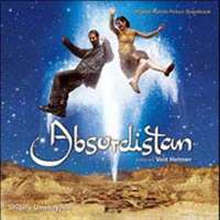 One of the hugely-enjoyable sleeper hits of the festival, but already massive in Sri Lanka, is MACHAN, based on the true story the director saw in a newspaper. The plot centres around a group of Colombo men who live from hand-to-mouth and long for something better in a promised land like… Europe. So they apply to take part in the upcoming handball tournament in Germany, as the Sri Lankan National Handball Team – despite the fact that none of them have even heard of handball… let alone played it. This improbable, ragtag bunch of chancers includes an orange seller, grave digger and gigolo, and in Full Monty style, you find yourself egging them all on.
One of the hugely-enjoyable sleeper hits of the festival, but already massive in Sri Lanka, is MACHAN, based on the true story the director saw in a newspaper. The plot centres around a group of Colombo men who live from hand-to-mouth and long for something better in a promised land like… Europe. So they apply to take part in the upcoming handball tournament in Germany, as the Sri Lankan National Handball Team – despite the fact that none of them have even heard of handball… let alone played it. This improbable, ragtag bunch of chancers includes an orange seller, grave digger and gigolo, and in Full Monty style, you find yourself egging them all on.
ABSURDISTAN (right) is also based on a small newspaper story – about a group of women who went on a sex strike. And with the right push it could be one of next year’s biggest comic hits (it’s due out in April 2009). Director Veit Helmer has invented a village where all the men are workshy and all the women are put-upon, and his cast is drawn from 16 different nations across Europe. With the bucolic look of a Bruegel painting or Hogarth’s Gin Lane, crossed with a classic Ealing comedy, this has a simple plot, and virtually no dialogue. Basically, the villagers have no water and the women agree to withhold their favours until the water pipe is fixed and the drought is over. But will young sweethearts Aya and Temelko ever be united if the feud of the sexes remains unresolved? This is delightful, celebratory, feel-good filmmaking – and Helmer also revealed that many of the cast became couples during filming, so he’s not only been to Absurdistan weddings, but there have even been Absurdistan babies born in the past year.
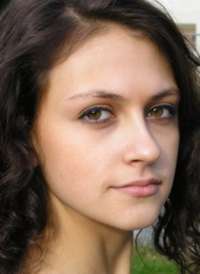 Last word, however, goes to the celebrated director Andres Veiel, subject of a festival retrospective. When asked how he manages with limited funds for his films, Veiel simply replied: “You have to learn to order Pizza Margherita rather than Pizza Marinara!”
Last word, however, goes to the celebrated director Andres Veiel, subject of a festival retrospective. When asked how he manages with limited funds for his films, Veiel simply replied: “You have to learn to order Pizza Margherita rather than Pizza Marinara!”
TOP THREE FESTIVAL FILMS
A YEAR AGO IN WINTER
ABSURDISTAN
NORTH FACE
TOP FOUR FESTIVAL PERFORMANCES
KATHERINA DERR (right) (Beautiful Bitch)
SUSANNE WOLFF (The Stranger In Me)
KAROLINE HERFURTH and JOSEF BIERBICHLER (A Year Ago In Winter)
Check out the official German Film Festival website at: Germanfilmfestival.co.uk
Review copyright © Helen M Jerome 2008.
Reviewer of movies, videogames and music since 1994. Aortic valve operation survivor from the same year. Running DVDfever.co.uk since 2000. Nobel Peace Prize winner 2021.
